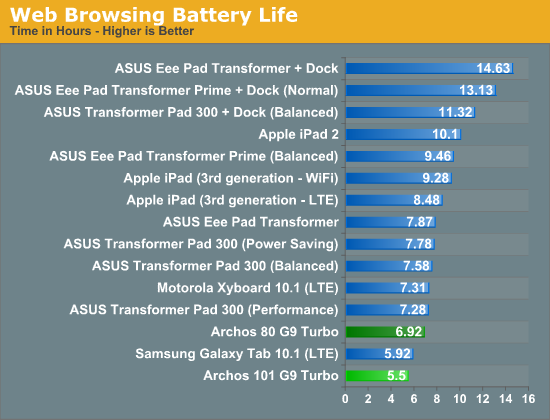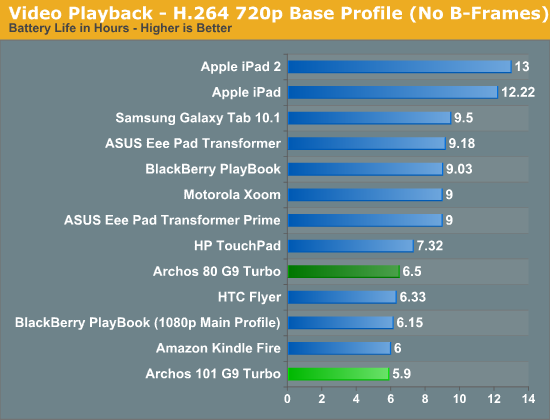The Archos G9 Tablet Reviews: Fast Enough
by Jason Inofuentes on May 23, 2012 12:45 PM ESTBattery Life
No mobile device is anything without decent battery life. And with a focus on mobile media consumption you'd hope to get through a few movies before reaching for your cord? So how'd the G9s do?

First, our Web Browsing Battery Life test, which cycles through several web pages consecutively, with the screen set to 200 nits of brightness. Things don't look so good. The 101 fares worse than Samsung's Galaxy Tab 10.1 on LTE, while the 80 fares a tick better than that, but a half hour worse than the Motorola Xyboard using its LTE radio. Maybe it'll do better with the WiFi turned off?

Sadly, longevity is just not their strong suit. The thickness of the tablet should be able to conceal a beefy battery, but that's not quite up to snuff with the current crop of tablets. How much this is a dealbreaker depends on the usage model. If you consider that there's still time on each of these to watch at least two-thirds of the Lord of The Ring Trilogy before recharging, that's plenty enough for traveling. However, that pretty much precludes using the tablets for much of anything else. It should also be noted, the addition of that 250GB HDD option would sap even more battery life away.
Conclusion
It’s hard to stratify tablet manufacturers into market categories; they don’t distribute themselves neatly into bargain, mainstream and high-end. Certainly some have cemented their place; you won’t find us arguing that Coby’s products are high-end. And some are trying to be all things to all players (Samsung and Asus come to mind). Even hardware platforms transcend pricing, with the same chipsets being used in bargain and high-end devices.
This lack of clarity between the high-end and low-end is Archos’s opportunity and its hurdle. With no clear way to stratify based on cost, simply pick a price and offer features of a particular flavor. The 80 and 101 G9 Turbo line are no better or worse than other dual-core Android tablets at being just that, Android tablets. But where they rise above is in targeting the media hungry user that’s not interested in signing up for another movie rental service, and knows their way around an SD card adaptor. Measured against the early class of Tegra 2 tablets, Archos puts up a good fight and hits the right price. Where things start to get fuzzy is when you look at the top of the line 101 G9 Turbo equipped with a 250GB HDD. At $369, this spec is just $30 short of the Transformer Pad 300, whose screen, battery life and performance outpace the G9 in key areas.
In the end, if you're someone with a huge collection of videos that has been looking for a tablet to compliment their viewing habits, the Archos G9 line is just good enough to be worth your while. But not good enough to be easy to recommend. The build quality and screen aren't as refined as we'd like, and the battery life is crippling for long trips. But with a brave pursuit of performance and an exceptional focus on media consumption, Archos clearly has what it takes to put together a compelling tablet. Early signs point to big things for Archos's next tablet generation. Which isn't too surprising for the company that was in this space before anyone else.


_575px.jpg)








39 Comments
View All Comments
jjj - Wednesday, May 23, 2012 - link
Wish you had the HDD versions too,to see how the perf and battery life are impacted.As for the tablet ,too bad the screen is TN.
Why no wifi tests? And ofc, as always, wish you had better battery life tests and some storage perf testing.
tipoo - Wednesday, May 23, 2012 - link
Yeah, I'm curious how the HDD would perform with an OS like Android. It seems tablet OSs are well optimized for NAND and predictable read/write speeds unlike what you get with hard drives.Souka - Thursday, May 24, 2012 - link
*sigh*fast cpu = good
poor display and battery life = bad
too many other options out there for a tablet that misses out on 2 of 3 important factors in a tablet design.
My $.02
dkfx77 - Thursday, May 24, 2012 - link
Well, in fact the OS doesnt use the HDD. They got a 4GB flash mem for the system. Then the HDD is only used for your files, not for Android.So I guess, as far as u dont play a video or listen to mp3 files, it wont affect the battery that much...
dkfx77 - Thursday, May 24, 2012 - link
It also saves the HDD life expectancy cause you know, not read every 10sec...JasonInofuentes - Wednesday, May 23, 2012 - link
I worry about our WiFi tests, for a few reasons. First, the objectiveness of our reception tests are marred by the fact that our data is different for each of our testers. We test in our homes, and since we don't all live together in a massive AnandVille campus in North Carolina, that means that each of us would want to test WiFi reception we would each have our own test routine and our own test data. Seeing as how I would be comparing it to just the Samsung Galaxy Tab 10.1, my data wouldn't be all that interesting. I did take the tablets on a walk along side that Galaxy Tab, to see when they'd drop out, and they all dropped out at the same time. Those outdoor shots are actually on my deck, as far from my router as you can get and still be on the property, and all devices acted the same.As far as our WiFi throughput tests, that's another of our tests that we're hit or miss on reporting. With an all plastic chassis there should be no issues like the Transformer Prime experienced. And in practice I had no issues using the device on WiFi, though I didn't do any large file downloads. Will remember your note next time, though.
All that said, what's wrong with our battery life tests?!? They're consistent and getting better! We're working to tweak them so there's less opportunities for browsers to cache the files and bolster their Web Browsing scores. And as for the playback tests, I love watching Quantum of Solace over and over again. Don't you? :)
silverblue - Thursday, May 24, 2012 - link
Trade for Casino Royale. ;)Penti - Thursday, May 24, 2012 - link
The screen is MVA, Archos used to use TN and I would have rejected them then basically because of that detail. There might exist some good TN-panels but on a tablet I want something with good viewing angles and the Archos screen (don't have one) should do that. More worryingly a TN panel would have washed out in sunlight and not be viewable in strong sunlight outside though. That said I still liked following them because of their long heritage in the PMP/Tablet field. Acer was also someone I did not count when they used TN screens.Other tablets that use MVA screens is for example the Motorola Xoom. PVA is used on some of Acer's later models too. You should really do it justice by evaluating the actual use of the display, describing it and give a small representation of how it is to look at subjectively, that it has a weak backlight (or backlight setting) doesn't really say if it is worse then a HTC Flyer screen which is a TN-screen with low (-er) viewing angles and prone to wash out so it would be trouble to use outside in the sun. At least you mentioned it would be pressed and hardly readable or barely in sunlight in the HTC Flyer review.
Penti - Thursday, May 24, 2012 - link
Also you can get the Archos G9's (both 101 and 80) with 16GB internal storage at least in Europe. Cheaper to get a MicroSD card though. Don't know if they increase the internal app storage with the larger model.Also I guess it's good enough that you review the screens and gave a more in depth representation at the display page/section. Calling it TN might have stretch it and gave the wrong impression though. Good to point out that the quality and uniformity seems to be worse on the 80 though. Others have described the screen on the 80 G9 as good or good enough definitively not the worse there is or worse in class and at least have not been bothered (much) by shifting colors with normal viewing angles (say up to 45). The 101 might still be noticeable better though. Nobody expects Archos to have the best screens but adequate is enough.
As long as their customers is happy with it. Might not have much to put up against newer ICS tablets as far as the 101 is concerned though, but at least it's not running Tegra 2. Then again it's only a speed bump on an older model. It is not price competitive any more.
Penti - Thursday, May 24, 2012 - link
Sony Mobile is still based in Lund (Sweden, they moved their London head office back to where most of their engineers are) with a few thousand employees there. Their new Japanese CEO will be based in Lund and Tokyo. Good to see it being taken over by the Japanese that might give them better management culture though. The Tablets was a venture from Sony in Japan though, don't not if they will fold it into Sony Mobile. They were really late to get some good or at least decent Android devices out but lately recovered some and has a good mind share in Sweden. Don't know how the other guys in Lund fairs presumably ST-Ericsson (former EMP guys) took a huge hit when Nokia decided they wouldn't release any (more) Symbian or MeeGo products on their chips despite being signed on as an supplier, they even had a MeeGo BSP more or less ready. At least they seem to have entered the Android game now with some customers in China (with their built in TD-SCDMA baseband) plus now on new Sony Mobile phones. It's basically up the Japanese to not force all the mobile professionals (not working on base stations) to go to the Chinese companies which already has a presence here. Some plurality is good and some continuance is good rather then closing shop and reorganizing in other companies which means some stuff would just fall out of history.